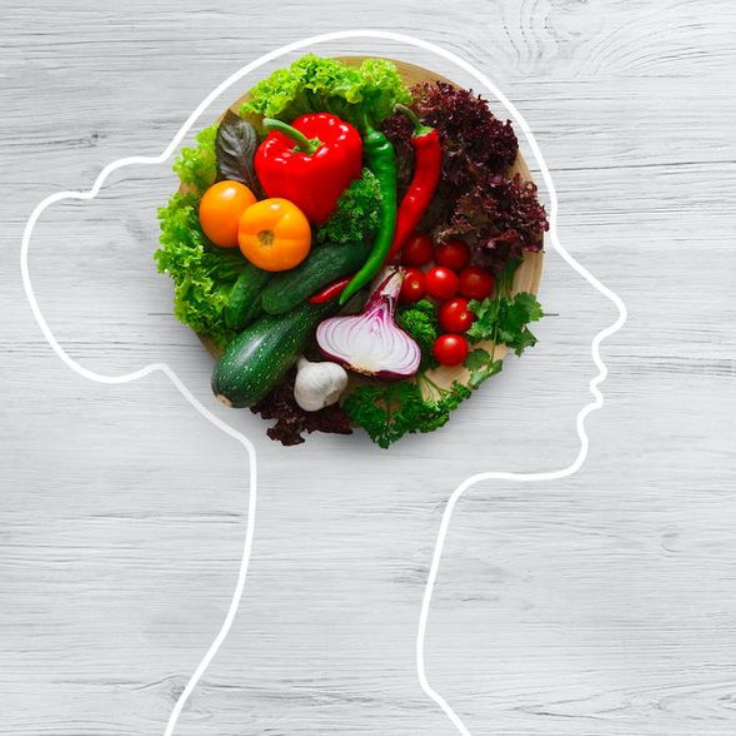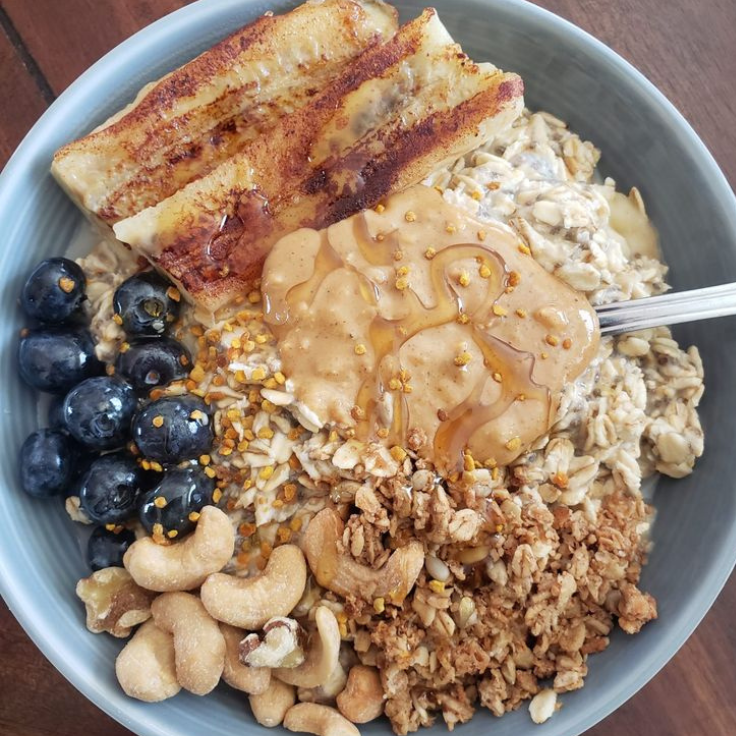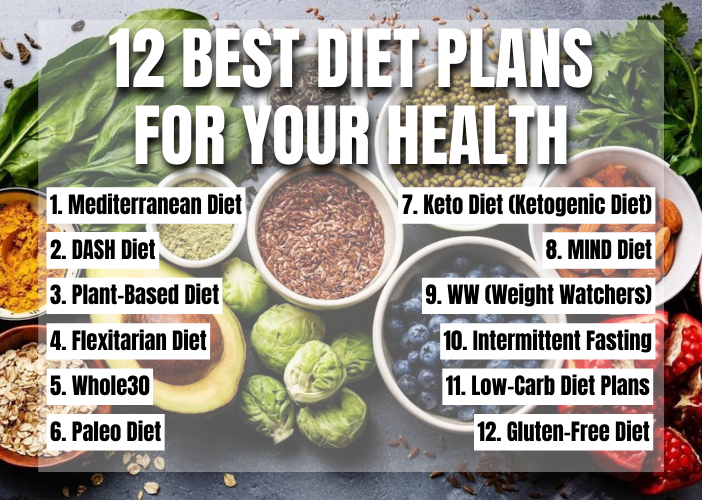Introduction
In today’s world, where health and wellness have taken center stage, the importance of a balanced and nutritious diet cannot be overstated. With the myriad of diet plans available, choosing the right one can be overwhelming. A well-chosen diet plan can not only help manage weight but also improve overall health, prevent chronic diseases, and boost mental well-being.
This guide explores 12 Best Diet Plans for Your Health known for their health benefits, backed by scientific research and expert recommendations. From the heart-healthy Mediterranean Diet to the brain-boosting MIND Diet, and the weight-loss-focused Keto Diet to the flexible Flexitarian Diet, each plan offers unique advantages tailored to different health goals and lifestyles.
Whether you aim to reduce blood pressure, manage diabetes, lose weight, or simply adopt healthier eating habits, this comprehensive overview will help you make an informed decision. 12 Best Diet Plans for Your Health Read on to discover the principles, benefits, and key foods of each diet plan, and find the one that best aligns with your personal health objectives.
What Are Diet Plans and Why Are They Important?
Definition
A diet plan refers to a structured approach to eating that outlines specific guidelines and recommendations for food and beverage consumption. These plans are designed to promote health, achieve specific health goals (such as weight loss or management), and support overall well-being.
Importance
- Nutritional Balance: Diet plans help ensure individuals consume a balanced mix of essential nutrients, including vitamins, minerals, proteins, fats, and carbohydrates. This balance is crucial for maintaining bodily functions, supporting metabolism, and promoting overall health.
- Health Management: By following a diet plan tailored to specific health needs, individuals can manage conditions such as diabetes, hypertension, and heart disease. Certain diets, like the Mediterranean or DASH diet, are known to lower the risk of chronic diseases and improve cardiovascular health.
- Weight Control: Many diet plans are designed to help individuals achieve and maintain a healthy weight. Whether the goal is weight loss, weight maintenance, or muscle gain, structured eating plans provide guidance on portion sizes, calorie intake, and food choices.
- Disease Prevention: Adopting a healthy diet plan can significantly reduce the risk of developing various diseases and conditions. For example, diets rich in fruits, vegetables, and whole grains are associated with lower rates of cancer, while those low in saturated fats can reduce the risk of heart disease.
- Lifestyle Adaptation: Diet plans can be adapted to fit different lifestyles and dietary preferences, whether vegetarian, vegan, gluten-free, or others. This flexibility ensures that individuals can follow a diet that suits their cultural background, ethical beliefs, or food intolerances.
- Mental Well-being: Proper nutrition is closely linked to mental health. Diet plans that include foods rich in omega-3 fatty acids, antioxidants, and vitamins can support brain function, reduce the risk of depression, and enhance overall cognitive performance.
- Long-term Sustainability: Effective diet plans promote sustainable eating habits that individuals can maintain over the long term. This reduces the likelihood of yo-yo dieting and supports consistent health improvements.
1. Mediterranean Diet

The Mediterranean Diet is inspired by the traditional eating habits of countries bordering the Mediterranean Sea, including Greece, Italy, and Spain. This diet emphasizes whole, minimally processed foods such as fruits, vegetables, whole grains, nuts, seeds, and olive oil. It also includes moderate amounts of fish and poultry, while red meat and sweets are consumed less frequently.
Benefits
- Heart Health: Rich in healthy fats like monounsaturated fats from olive oil and omega-3 fatty acids from fish, the Mediterranean Diet is known to reduce the risk of heart disease.
- Reduced Inflammation: The high intake of fruits, vegetables, and nuts helps lower inflammation in the body.
- Improved Longevity: Studies have shown that adherence to the Mediterranean Diet is associated with a longer lifespan.
Key Foods
- Olive Oil: A primary source of fat, used in cooking and dressings.
- Fish: Particularly fatty fish like salmon, mackerel, and sardines.
- Fruits and Vegetables: Fresh, seasonal produce is emphasized.
- Nuts and Seeds: Almonds, walnuts, chia seeds, and flaxseeds.
- Whole Grains: Brown rice, quinoa, barley, and whole wheat products.
2. DASH Diet (Dietary Approaches to Stop Hypertension)

The DASH Diet was initially developed to help lower blood pressure without the use of medication. It emphasizes foods that are low in sodium and rich in potassium, magnesium, and calcium—nutrients known to help lower blood pressure.
Benefits
- Blood Pressure Reduction: By focusing on low-sodium foods and those rich in essential minerals, the DASH Diet effectively lowers blood pressure.
- Heart Health: This diet also reduces the risk of heart disease by promoting healthy eating habits.
- Weight Management: The emphasis on whole foods can help with weight loss and maintenance.
Key Foods
- Fruits and Vegetables: High in potassium and magnesium.
- Whole Grains: Brown rice, whole wheat bread, oatmeal.
- Lean Proteins: Chicken, fish, beans, and legumes.
- Low-Fat Dairy: Milk, yogurt, and cheese.
- Nuts and Seeds: Unsalted varieties.
3. Plant-Based Diet

A plant-based diet focuses on whole, minimally processed plant foods and excludes or minimizes animal products. This diet includes a variety of fruits, vegetables, whole grains, nuts, seeds, and legumes.
Benefits
- Heart Health: Lower in saturated fat and cholesterol, a plant-based diet reduces the risk of heart disease.
- Diabetes Management: Helps in controlling blood sugar levels and improving insulin sensitivity.
- Weight Loss: High in fiber and low in calorie density, promoting satiety and weight loss.
Key Foods
- Fruits and Vegetables: A diverse range, with an emphasis on variety and color.
- Whole Grains: Quinoa, brown rice, oats, and whole wheat products.
- Legumes: Beans, lentils, chickpeas, and peas.
- Nuts and Seeds: Almonds, walnuts, chia seeds, and flaxseeds.
- Plant-Based Proteins: Tofu, tempeh, and seitan.
4. Flexitarian Diet

The Flexitarian Diet is a flexible approach to vegetarianism that allows for occasional meat and animal products. It focuses on plant-based foods while permitting moderate consumption of meat and animal products.
Benefits
- Nutritional Balance: Provides the benefits of a plant-based diet while ensuring adequate protein and nutrient intake from animal products.
- Heart Health: Reduces the risk of heart disease by emphasizing plant foods.
- Weight Management: Promotes weight loss and maintenance through a balanced diet.
Key Foods
- Plant-Based Foods: Fruits, vegetables, whole grains, nuts, seeds, and legumes.
- Occasional Meat: Lean meats like chicken and fish, with limited red meat.
- Dairy and Eggs: In moderation, for additional protein and nutrients.
5. Whole30

The Whole30 program is a 30-day dietary reset designed to eliminate foods that may cause inflammation, gut issues, and cravings. For 30 days, participants eliminate sugar, alcohol, grains, legumes, soy, and dairy.
Benefits
- Identifying Food Sensitivities: Helps in pinpointing foods that may cause adverse reactions.
- Improved Digestion: By eliminating potential irritants, digestion often improves.
- Resetting Eating Habits: Encourages a focus on whole, nutrient-dense foods.
Key Foods
- Meat and Seafood: Grass-fed, pasture-raised, and wild-caught options.
- Vegetables: A wide variety, excluding legumes.
- Fruits: Allowed in moderation.
- Healthy Fats: Coconut oil, olive oil, avocado oil, and nuts.
- Herbs and Spices: For flavoring dishes without processed sauces.
6. Paleo Diet

The Paleo Diet is based on the eating patterns of our Paleolithic ancestors. It emphasizes whole foods and excludes grains, legumes, dairy, and processed foods.
Benefits
- Weight Loss: By eliminating processed foods and focusing on whole foods, weight loss is often achieved.
- Improved Blood Sugar Control: Helps in stabilizing blood sugar levels.
- Reduced Inflammation: Encourages consumption of anti-inflammatory foods.
Key Foods
- Meat and Fish: Grass-fed, pasture-raised, and wild-caught.
- Vegetables: A diverse range, particularly non-starchy varieties.
- Fruits: In moderation, with a focus on low-glycemic options.
- Nuts and Seeds: Almonds, walnuts, and pumpkin seeds.
- Healthy Fats: Olive oil, coconut oil, and avocados.
7. Keto Diet (Ketogenic Diet)

The Keto Diet is a high-fat, low-carbohydrate diet that puts your body into a state of ketosis, where it burns fat for fuel instead of carbohydrates.
Benefits
- Rapid Weight Loss: The state of ketosis promotes significant weight loss.
- Improved Blood Sugar Control: Effective for managing and preventing type 2 diabetes.
- Increased Energy Levels: Fat is a more stable energy source, reducing energy crashes.
Key Foods
- High-Fat Foods: Avocados, nuts, seeds, and oils.
- Meat and Fish: Fatty cuts of meat, fish, and seafood.
- Low-Carb Vegetables: Leafy greens, cauliflower, and zucchini.
- Dairy: High-fat options like cheese, butter, and cream.
- Berries: In moderation, for their low sugar content.
8. MIND Diet (Mediterranean-DASH Intervention for Neurodegenerative Delay)

The MIND Diet combines elements of the Mediterranean and DASH diets to promote brain health and reduce the risk of Alzheimer’s disease.
Benefits
- Brain Health: Focuses on foods that improve cognitive function and delay cognitive decline.
- Heart Health: Shares the heart-healthy benefits of the Mediterranean and DASH diets.
- Reduced Inflammation: Encourages anti-inflammatory foods.
Key Foods
- Leafy Greens: Spinach, kale, and collard greens.
- Berries: Blueberries and strawberries, known for their brain-protective properties.
- Nuts: Almonds, walnuts, and other nuts.
- Olive Oil: Used as the primary cooking fat.
- Whole Grains: Brown rice, quinoa, and whole wheat products.
- Fish: Fatty fish like salmon and sardines.
9. WW (Weight Watchers)

WW, formerly known as Weight Watchers, is a point-based system that encourages healthy eating, physical activity, and positive lifestyle changes. It assigns point values to foods based on their nutritional content.
Benefits
- Sustainable Weight Loss: Encourages gradual, sustainable weight loss through a balanced diet.
- Flexibility: Allows for all foods in moderation, making it easier to adhere to.
- Support System: Offers a strong community and support network.
Key Foods
- Fruits and Vegetables: Emphasized for their low point values.
- Lean Proteins: Chicken, fish, beans, and legumes.
- Whole Grains: Brown rice, whole wheat bread, and oats.
- Healthy Fats: Avocado, nuts, and olive oil.
- Moderation: Allows for occasional indulgences within the points system.
10. Intermittent Fasting

Intermittent fasting alternates periods of eating and fasting. Common methods include the 16/8 method (16 hours fasting, 8 hours eating), the 5:2 method (eating normally for five days and significantly reducing calories for two non-consecutive days), and the Eat-Stop-Eat method (24-hour fasts once or twice a week).
Benefits
- Weight Loss: Promotes weight loss by reducing calorie intake and increasing fat burning.
- Improved Metabolic Health: Enhances insulin sensitivity and reduces inflammation.
- Longevity: Some studies suggest intermittent fasting may extend lifespan.
Key Foods
- Flexible Eating Windows: Focuses on eating whole, nutrient-dense foods during eating periods.
- Hydration: Water, tea, and black coffee are encouraged
11. Low-Carb Diet Plans

A low-carb diet plan focuses on eating fewer carbohydrates, which are mainly found in sugary foods, pasta, and bread. Instead, you eat more protein, healthy fats, and vegetables. The goal is to keep carbs low, usually between 20 to 100 grams per day, depending on the specific diet.
Benefits
- Weight Loss: Helps you lose weight by reducing hunger and increasing fat burning.
- Blood Sugar Control: Good for people with diabetes or insulin resistance as it helps manage blood sugar levels.
- Heart Health: Can improve heart health by lowering cholesterol and blood pressure.
- Reduced Triglycerides: Lower carb intake often reduces blood triglycerides.
- Mental Clarity: Some people find they can focus better and think more clearly.
- Lower Risk of Metabolic Syndrome: Reduces the risk of conditions that can lead to heart disease, stroke, and type 2 diabetes.
Key Foods
- Protein Sources:
- Meat: Beef, pork, lamb, chicken, and turkey.
- Fish and Seafood: Salmon, trout, sardines, and shellfish.
- Eggs: Whole eggs, including the yolk.
- Vegetables:
- Leafy Greens: Spinach, kale, and Swiss chard.
- Cruciferous Vegetables: Broccoli, cauliflower, and Brussels sprouts.
- Other Low-Carb Veggies: Bell peppers, zucchini, and asparagus.
- Fruits (in moderation):
- Berries: Strawberries, blueberries, raspberries, and blackberries.
- Other Low-Carb Fruits: Avocado and olives.
- Nuts and Seeds:
- Almonds, walnuts, flaxseeds, chia seeds, and sunflower seeds.
- Dairy Products:
- Cheese, Greek yogurt, and cottage cheese (preferably full-fat).
- Healthy Fats:
- Olive oil, coconut oil, butter, and ghee.
- Nuts and seeds, and their butters.
- Fatty fish like salmon and mackerel.
- Beverages:
- Water, coffee, tea, and bone broth.
12. Gluten-Free Diet

A gluten-free diet means not eating the protein gluten, which is found in grains like wheat, barley, and rye. This diet is necessary for people with celiac disease, non-celiac gluten sensitivity, and wheat allergy. In celiac disease, eating gluten damages the small intestine. Non-celiac gluten sensitivity causes similar symptoms but without the intestinal damage.
Benefits
- Helps Celiac Disease Patients:
- Reduces symptoms like bloating, diarrhea, and stomach pain.
- Prevents long-term problems like nutrient deficiencies and bone issues.
- Improves Non-Celiac Gluten Sensitivity Symptoms:
- Lessens fatigue, headaches, and joint pain.
- Manages Wheat Allergy:
- Prevents allergic reactions, which can be mild or severe.
- Better Digestion:
- Some people feel better and have fewer digestive problems even without a diagnosed condition.
- Healthier Food Choices:
- Promotes mindful eating and often leads to choosing more natural, unprocessed foods.
Key Foods
- Fruits and Vegetables:
- All fresh fruits and vegetables.
- Meat, Fish, and Poultry:
- Fresh, unprocessed meat, fish, and poultry.
- Dairy Products:
- Milk, cheese, yogurt, and butter without gluten additives.
- Gluten-Free Grains:
- Rice, corn, quinoa, millet, buckwheat, and labeled gluten-free oats.
- Legumes:
- Beans, lentils, chickpeas, and peas.
- Nuts and Seeds:
- Almonds, walnuts, sunflower seeds, chia seeds, and flaxseeds.
- Gluten-Free Flours:
- Almond flour, coconut flour, rice flour, and tapioca flour.
Advantages and Disadvantages of Diet
Following a specific diet can have both advantages and disadvantages depending on individual needs, goals, and health conditions. Here’s a balanced overview:
Advantages
- Weight Management: Diets help regulate calorie intake, facilitating weight loss or maintenance, which is beneficial for overall health and reducing obesity-related risks.
- Nutrient Adequacy: A well-planned diet ensures adequate intake of essential nutrients like vitamins, minerals, and proteins, supporting optimal bodily functions and overall health.
- Disease Prevention: Certain diets, such as the Mediterranean and DASH diets, are linked to reduced risks of chronic diseases like heart disease, diabetes, and hypertension due to their nutrient-rich and balanced nature.
- Improved Digestion: Diets rich in fiber promote healthy digestion, prevent constipation, and support a healthy gut microbiome, contributing to overall digestive health.
- Enhanced Mental Health: Nutrient-dense diets can improve mood and cognitive function, reducing the risk of depression and anxiety by providing essential nutrients that support brain health.
- Increased Energy Levels: Balanced diets provide sustained energy throughout the day, supporting physical activity levels and overall productivity.
- Better Skin Health: Diets rich in antioxidants and healthy fats promote skin health by protecting against oxidative damage and supporting collagen production.
- Longevity: Healthy eating habits contribute to a longer lifespan and improved quality of life by reducing the risk of age-related diseases and maintaining overall vitality.
- Positive Lifestyle Changes: Adopting a diet often leads to other healthy lifestyle changes, such as increased physical activity and better stress management, promoting overall well-being.
- Educational Benefits: Following a diet encourages learning about nutrition and food choices, empowering individuals to make informed decisions about their health.
Disadvantages
- Restrictive Nature: Some diets can be overly restrictive, limiting food choices and potentially leading to nutrient deficiencies if not properly planned.
- Social Limitations: Diets can make social gatherings and dining out challenging, impacting social interactions and enjoyment of meals with others.
- Initial Cost: Some specialized diets, such as organic or specific meal plans, may be more expensive, making them less accessible to everyone.
- Potential Nutrient Deficiencies: Poorly planned diets or overly restrictive ones may lack essential nutrients, leading to deficiencies and health risks over time.
- Difficult to Maintain: Strict diets may be difficult to sustain long-term, leading to cycles of weight loss and regain or feelings of failure.
- Impact on Mental Health: Obsessive focus on dieting or food restrictions can contribute to disordered eating patterns, anxiety, or guilt surrounding food choices.
- Unrealistic Expectations: Diets promising rapid weight loss or dramatic health improvements may create unrealistic expectations and disappointment if results are not achieved.
- Individual Variability: Not all diets work the same for everyone due to individual differences in metabolism, genetics, and health conditions.
- Potential for Muscle Loss: Very low-calorie diets or those lacking sufficient protein may lead to muscle loss along with fat loss, affecting overall body composition.
- Dependency on Supplements: Some diets may require supplementation to meet nutritional needs adequately, adding to the cost and complexity of the diet plan.


